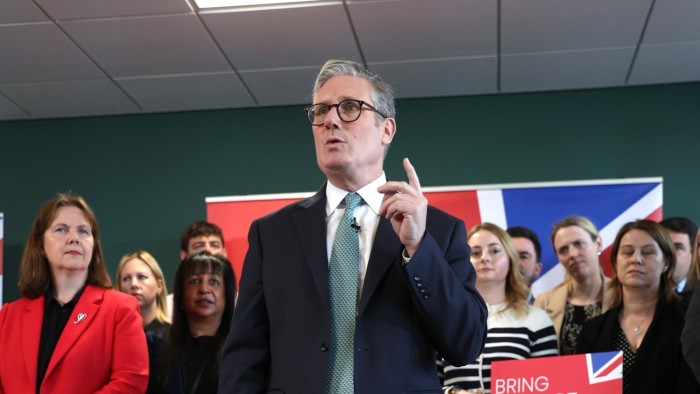This article is an on-site version of our Inside Politics newsletter. Subscribers can sign up here to get the newsletter delivered every weekday. If you’re not a subscriber, you can still receive the newsletter free for 30 days
Good morning. How do you solve a problem like Reform UK, and how much of a constraint should that be on Keir Starmer’s plans? That’s the debate raging within government at the moment and one that will become more intense after whatever happens at England’s local elections on Thursday. For now, some thoughts on exactly why so much time in Westminster is spent discussing an election that is the best part of half a decade away.
Inside Politics is edited by Georgina Quach. Follow Stephen on Bluesky and X, and Georgina on Bluesky. Read the previous edition of the newsletter here. Please send gossip, thoughts and feedback to insidepolitics@ft.com
Dead end
Here’s a fun fact for you. At this point after the 1979 general election, Labour’s Jim Callaghan was still leading the opposition. David Owen and Bill Rodgers, who were members of good standing on his front bench, would form the Social Democratic Party in 1981 along with Shirley Williams and Roy Jenkins (both out of parliament at the time).
I say this to illustrate a really simple point, which is that a parliamentary term is a really long time, and that calibrating your government’s policy strategy around the next election (which will happen by August 2029) is crackers. Sure, there is the big picture stuff of “it would be good if we could have some popular budgets at the end of the parliament” — no kidding. But on almost everything else, it’s the road to ruin.
Take three of the biggest things facing our continent and indeed the planet right now. The next election will probably take place after the end of Donald Trump’s second term in office. What will that world be like? What will the capabilities and the running cost of artificial intelligence be? And how will the wars between Russia and Ukraine and Israel and Hamas have resolved, or not resolved themselves?
These are huge known unknowns, and then there are important but lower order ones such as “who will lead the UK opposition parties at the time?”
But there is so much chatter about the outcome of the next election because the prime minister consciously travels light when it comes to political philosophy. Almost all organisations are happier and more functional if people can work to the boss. In lieu of being able to work towards Starmer’s project, Labour MPs and the government instead work to their other boss: the electorate. Thus the guiding principle becomes “the polls”.
There’s one problem with that: it is self-defeating. Miranda Green has a terrific piece on what “Reform curious” Labour voters want (and fear), and what the rest of Labour’s electoral coalition want:
The big takeaway, as Miranda notes is, “don’t do anything that smells of austerity”. But the other big thing that all Reform voters want is for immigration to drastically fall, while most Labour voters do not want their own taxes to rise. Neither aim is compatible with the better functioning public services that they also want.
One reason not to base your government’s policy strategy on a distant election is most of us want contradictory things from our government (I, for example, think we need broad-based tax rises but am raging about my tax burden in a way only someone doing their tax return early can do). Part of governing is to work out what you think we really want and deliver it, rather than try to shape your whole government around an election of which the circumstances are largely unknowable.
Now try this
I saw Holy Cow this weekend — a lovely debut by a new French director. Jonathan Romney’s review is here.
Top stories today
-
Thursday in charts | Voters in England go the polls in a round of local elections that some analysts believe could signal the beginning of a new era of multi-party politics, threatening the Labour and Conservative duopoly. George Parker breaks down what you need to know, with some great data visualisation of party leaders’ approval ratings and more.
-
Degrees of separation | The number of US students looking to study at UK universities has risen sharply since Donald Trump launched his attack on some of America’s top higher education institutions, data shows.
-
Gen Z’s job opportunities hit | The UK risks creating a “lost generation” unless ministers take immediate action to stop young people drifting away from the workplace, business leaders warned yesterday.
-
‘I am angry about Labour’ | “It’s going to be a very close race,” said one Labour activist in Runcorn, where voters will elect their next MP on Thursday. “We need to motivate Labour supporters . . . and we need to win over some former soft Tories and Lib Dems who are terrified of the prospect of having a Reform UK MP.” Jim Pickard took the temperature in Runcorn.




